Tag: women in politics
Hon. Loni Hancock: Member of the California State Senate, December 2008-November 2016
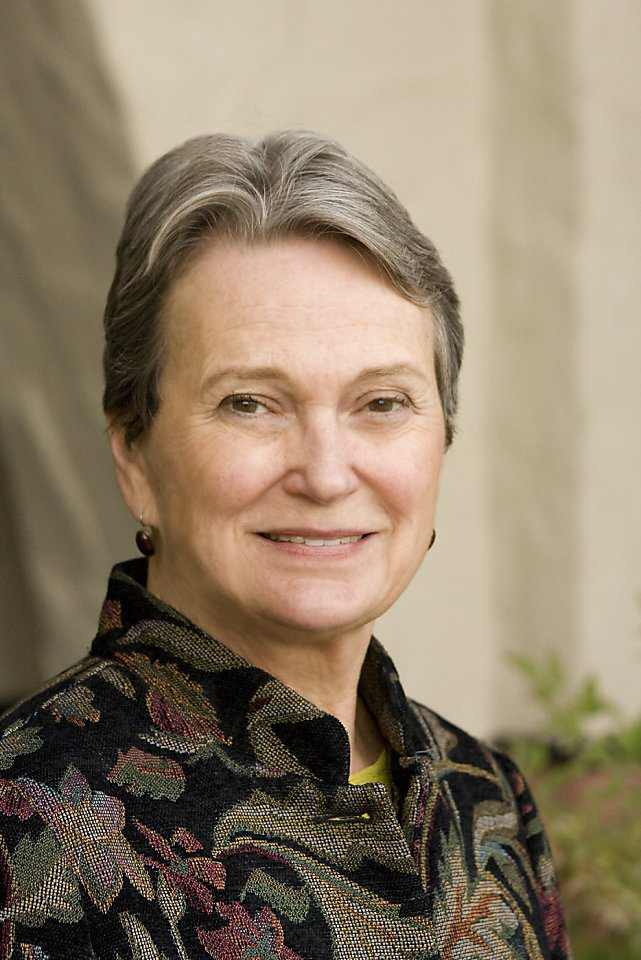
In spring 2021, I had the pleasure of interviewing the Hon. Loni Hancock for the California State Archives State Government Oral History Program. As an interviewer, one of my major areas of interest is the history of women’s political work, and Loni Hancock’s name appears over and over in the course of this study. Indeed, her life and work are integral to understanding California’s recent political history and the greater inclusion of women in elected office.
Loni Hancock is a former California State Senator (2008-2016), California State Assemblymember (2002-2008), Mayor of Berkeley (1986-1994), and Berkeley City Councilmember (1971-1979). Hancock was born in 1940 in Chicago, Illinois, and grew up in New York City. She attended Antioch College, Cornell College, and graduated with a BA from Ithaca College in 1963. Hancock later earned a MA from the Wright Institute in 1978. In addition to serving in elected office as a Democrat, Hancock also previously worked as the regional director for ACTION in the Carter administration, the director of the Shalan Foundation, and headed the Western Regional Office of the Department of Education in the Clinton administration. She currently partners with East Bay Supportive Housing Collaborative to advocate for supportive housing for people with serious mental illnesses, and is working to preserve Berkeley’s architectural heritage.
Hancock moved to Berkeley, California, in 1964 amidst the community’s reckoning with school desegregation and the Free Speech Movement. This zeitgeist in 1960s Berkeley inspired Hancock to follow her own interests in political activism. Indeed, it was her involvement in the local peace movement that propelled her into electoral politics. In her interview, Hancock explained, “Berkeley is a place where things begin. And whatever is in the air here has, I think, encouraged us to be standing up for what we believe is right, and arguing it out among ourselves.”
After an unsuccessful first campaign in 1969, Hancock won election to Berkeley City Council in 1971. For a time, she was the only woman on this governing body. Hear Hancock reflect on gendered expectations for Berkeley City Councilmembers in the 1970s:
After her time as Mayor of Berkeley, as well as work in several Democratic administrations and nonprofits, Hancock felt she could continue to contribute to her community by running for legislative office—first as a California State Assemblymember and then as a California State Senator. During her time in the California Legislature (2002-2008, 2008-2016), Hancock worked on many important issues. Notably, she was a major proponent of environmental legislation. Hancock introduced SCA-5 (later approved by voters as Proposition 25), which proposed passage of state budgets with a simple majority vote rule. She also advocated for criminal justice reform, including funding for prison education programs. Of this work, Hancock explained,
“One of the things we did was get a lot of prison education funded and implemented and get more money for rehabilitation programs. And actually, one of my best bills that was a my-idea bill was we gave full reimbursement for community colleges in California to run transfer-level courses in our state prisons. The idea being that you would get your basic first two years of college done, and then you could transfer to a UC or CSU on release…The recidivism rate goes down to virtually zero when that happens, so anyway, it makes safer communities, is what it does.”
Hancock’s legislative contributions have certainly helped shape recent California politics. But as the California State Legislature still struggles with gender parity of elected officials, her presence and perspectives as a woman in both bodies have also been key. In thinking about the strides toward greater representation of women in California politics, Hancock reflected,
“Well, we had our first woman speaker [in the Assembly], Karen Bass. We had our second woman speaker, Toni Atkins, who’s now the [Senate] pro tem. Those were milestones, really important milestones. You know, also, Karen was the first woman of color, and I’m guessing that Toni might be the first LGBTQ woman as a head [in California State government]…so you have women in leadership, which I think makes an interesting difference, and more women…So you know, there’s definitely progress, definitely.”
And Hancock’s tenure in California politics has certainly been a part of this progress. Read Loni Hancock’s oral history interview to learn more about her life and work in California politics!
Find this interview and all our oral histories from the search feature on our home page. You can search by name, keyword, and several other criteria.
About the Oral History Center
The Oral History Center of The Bancroft Library has interviews on just about every topic imaginable. You can find the interviews mentioned here and all our oral histories from the search feature on our home page. Search by name, keyword, and several other criteria. We preserve voices of people from all walks of life, with varying political perspectives, national origins, and ethnic backgrounds. We are committed to open access and our oral histories and interpretive materials are available online at no cost to scholars and the public.
Sign up for our monthly newsletter featuring think pieces, new releases, podcasts, Q&As, and everything oral history. Access the most recent articles from our home page or go straight to our blog home.
JoAnn Fowler: Building the Foundations of SLATE
The Oral History Center has been conducting a series of interviews about SLATE, a student political party at UC Berkeley from 1958 to 1966 – which means SLATE pre-dates even the Free Speech Movement. The newest addition to this project is an oral history with JoAnn Fowler, who was a founding member of the organization in the late 1950s.
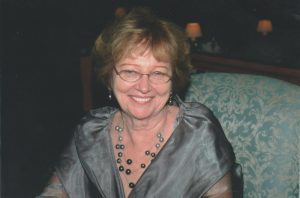
JoAnn Fowler is a retired Spanish language educator and was a founding member of the University of California, Berkeley student political organization SLATE in the late 1950s. Fowler grew up in Los Angeles, California. She attended UC Berkeley from 1955 to 1959, where she became active in SLATE and served in student government through Associated Students of the University of California (ASUC). After completing a master’s degree at Columbia University, she worked as a teacher, mostly in Davis, California. Find this interview and all our oral histories from the search feature on our home page. You can search by name, key word, and several other criteria.
I have previously written about the contributions of women members of SLATE and their sometimes complicated feelings about gender roles in this student political group. Fowler, however, did not feel that being a woman was not an obstacle for her in SLATE, and her interview includes memories of her own role in shaping the organization.
Fowler recalls being an outspoken SLATE member from the start. At her first meeting with the group in the fall of 1957, she recalled being overwhelmed by the advanced political theory many of the group discussed, and by one faction that she perceived “wanted to sit around and talk these things to death and not try to take any kind of action.” She felt that in order to be politically effective, the group had to take another approach:
I’m very verbal, I’m not shy at all, I speak right up, I don’t care, I have nothing to lose here. I say that, “You have to do something within the campus, you have to work within the campus. If you want to get all these things done, you have to get elected and do things on campus.”…So that’s the position I take, and that’s the position that Pat Hallinan takes, and so we win over the majority of these people…
Perhaps Fowler’s greatest contribution to the group was that in the spring of 1958 she ran for and won a position with ASUC on the SLATE ticket. This made Fowler and Mike Gucovsky the first SLATE members to have a voice in student government at UC Berkeley, and being able to affect progressive political change from positions of campus leadership was a key goal of the group. In speaking of her campaign platform, Fowler remembered:
If you were to name anything, we ran on all of it, but not all of that could be addressed during the campaign. Basically, it was: freedom of speech was addressed through [being] against the [House] Un-American Activities Committee and also by the relationship between professors and the students that should be confidential and the anti-Loyalty Oath. Then there was civil liberties in the South; in Berkeley with that housing ordinance that came up for vote; and on the campus that no fraternity or sorority should discriminate.
She continued discussion of that ASUC campaign, saying:
This was encouraged by Mike Miller. I didn’t mind running—that was going to be great—but I did mind speaking to big groups. I hadn’t had a lot of experience doing that, so he encouraged me to do that. I went around only two nights that I remember, and it was only to men—I never spoke to women—and only at the co-ops. That was my background; I’d come out of co-ops. I’d go in at dinnertime and I would speak for two minutes, maybe somebody introduced me and maybe somebody didn’t. I’d speak for two minutes to those very immediate concerns that I thought would be very appealing, and I would have this overwhelming applause. But I felt that anybody, any woman could have stood up there and gotten this overwhelming applause, because that’s the kind of applause I felt it was. I don’t know, maybe that’s just me. I don’t know who else spoke there. I don’t know if men spoke there, if other independents have reached out, I have no idea.
Even after she graduated from UC Berkeley in 1959, the lessons she learned from SLATE stayed with her. While living in Davis, she worked at a Hunt’s tomato factory, where she attempted to organize the office workers. Later, she headed the Davis Teachers Association, supporting a raise in teachers’ salaries. These organizing efforts didn’t always succeed, but Fowler saw them as part of a larger political project she’d been passionate about since her time in college. She explained, “But I did my bit, and so without SLATE, I wouldn’t have…tried, no, I wouldn’t have tried.”
Reflecting on how her involvement with SLATE impacted her life, Fowler observed:
I think it was one of the greatest experiences of my life. I never would have been as politically aware. I didn’t have that background, I didn’t take political science, I didn’t take sociology; I took economics, I took psychology. I never would have been as aware or as active as I was, I wouldn’t have had a group. When I lived in an apartment, I didn’t have a social group or I didn’t have—you were going to come on campus and leave campus because you certainly didn’t meet too many people coming out of that lecture hall of 500 people. I’m glad I have that experience, very much so. It was a good time in my life.
To learn more about JoAnn Fowler’s life and political work, check out her oral history! Find this interview and all our oral histories from the search feature on our home page. You can search by name, key word, and several other criteria.
Panel with Bay Area Women Political Leaders on Zoom July 29
Come celebrate the launch of the Bay Area Women in Politics Oral History Project by joining us for a conversation about the history and future of Bay Area women in politics with former San Francisco Supervisor Louise Renne, Pittsburg Councilmember Shanelle Scales-Preston, and Oakland Mayor Libby Schaaf!
The panel discussion will take place over Zoom on Wednesday, July 29, from Noon—1 p.m. Pacific Time. Click here to RSVP. We will be moderating Q&A. If you would like to submit a question to the panelists, please email it beforehand to Amanda Tewes at atewes@berkeley.edu.
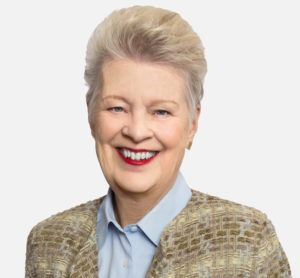
August 2020 marks the hundredth anniversary of women’s suffrage, and the anticipated nomination of a woman Democratic vice presidential candidate — both milestones of the national political roles for women. Here in the Bay Area, women have been driving political campaigns and activism for generations. Through first-person oral history interviews, the Bay Area Women in Politics Oral History Project from UC Berkeley’s Oral History Center will document and celebrate the lives and work of these political women, some of whom have been unsung.
To kick off this oral history project and to celebrate these milestones, join us for a panel conversation with three talented Bay Area women public officials: Louise Renne, Shanelle Scales-Preston, and Libby Schaaf! This panel will include discussion about the historical and current roles of Bay Area political women, lessons from across generations, as well as the challenges and opportunities facing women in politics.
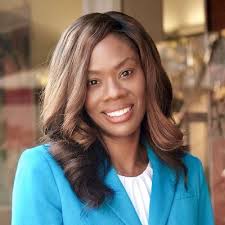
Louise Renne is a lawyer with the Renne Public Law Group, former San Francisco Supervisor (1978–1986), and former City Attorney for the City and County of San Francisco (1986–2001). She previously served as the General Counsel for the San Francisco Unified School District and as the City Attorney for the City of Richmond.
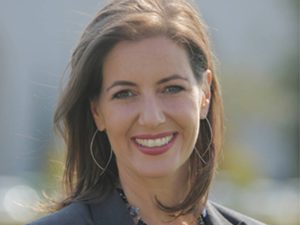
Shanelle Scales-Preston is a first-term member of the Pittsburg City Council, and District Director for Congressman Mark DeSaulnier. She previously worked for Congressman George Miller, and has been working in public service for nearly twenty years.
Libby Schaaf has been the Mayor of Oakland since 2015, and served on the Oakland City Council from 2011–2015. She was previously the Public Affairs Director for the Port of Oakland, and has a background in law.
The UC Berkeley Oral History Center is committed to putting voices in the historical record that might otherwise be lost, and providing the oral histories to the public at no cost. We are currently raising funds and need your help to undertake the expansion of this ambitious oral history collection. You can support this project by giving to the Oral History Center. Please note under special instructions: “For the Bay Area Women in Politics Oral History Project.” To learn more about this project, please contact Amanda Tewes at atewes@berkeley.edu.
Women of SLATE: Susan Griffin and Julianne Morris
The Oral History Center has been conducting a series of interviews about SLATE, a student political party at UC Berkeley from 1958 to 1966 – which means SLATE pre-dates even the Free Speech Movement. The newest additions to this project include two women who joined SLATE in the early 1960s at a tumultuous time at UC Berkeley: Susan Griffin and Julianne Morris.
Susan Griffin is an accomplished writer, and was a member of the UC Berkeley student political organization SLATE in the early 1960s. Griffin grew up in Los Angeles, California. She attended UC Berkeley, where she became active in SLATE, attending protests and engaging in political discussions. Griffin left Berkeley in 1963, but continued to work as a writer in the San Francisco Bay Area, producing many works, including Woman and Nature: The Roaring Inside Her. Over the years, Griffin remained active in causes of social justice, including the women’s movement and anti war protests.
Julianne Morris is a former social worker and mediator, and was a member of the UC Berkeley student political organization SLATE in the early 1960s. Morris grew up in Compton, California, and attended UC Los Angeles, where she helped found the student political group PLATFORM based on discussions with SLATE members. She then transferred to UC Berkeley, where she became active in SLATE, attending protests and running for ASUC student representative. Morris stayed at UC Berkeley to earn her master’s in social work. She then moved to New York City in 1964 and was a social worker for many years, where she helped start women’s centers, rape crisis programs, and became a part of the women’s movement. She returned to Berkeley in the early nineties and reconnected with former SLATE friends through reunions and an ongoing political discussion group.
Griffin and Morris were among the second generation of SLATE activists and joined the group around the same time in 1960 – after the famous HUAC protest in May of 1960 and before the Free Speech Movement in 1964. They also have similar upbringings in Jewish (adoptive family, in Griffin’s case) and politically left families who feared encroaching McCarthyism. These backgrounds helped ignite a political consciousness in both women that led them to SLATE.
Griffin and Morris’s oral histories build on an archive of SLATE history, but they also speak specifically to their experiences as women in this group. Both recount instances of feeling marginalized as women, of being left to do the “scut work” like mimeographing and cooking for hungry activists. They even recount tensions at a 1984 SLATE reunion in which those newly empowered by feminism expressed displeasure with the way they had been treated; many of the men denied this discrimination, but others took it to heart and sincerely apologized. And yet, Griffin and Morris both were encouraged to run for ASUC office in the early 1960s, campaigning on the SLATE platform and often pushing their own boundaries of what they thought was possible. Despite the challenges of being a woman in this campus political group, there were still opportunities to grow as individuals and as leaders.
Listen as Susan Griffin and Julianne Morris share their memories of running for ASUC on the SLATE ticket at UC Berkeley:
Even though both Griffin and Morris had decreased participation in SLATE or left campus by 1964, their experiences in the organization clearly shaped their perspectives about politics and activism, particularly as they both became involved with the women’s movement. Griffin explained, “The guys may not have known it, but they were training feminist activists in all that period.”
Most importantly, by recalling their times with SLATE and later political work, both Griffin and Morris emphasized the importance of building and sustaining community in activist groups. For Morris, joining SLATE helped her find a place where she belonged. Griffin pointed to organizations of politically like-minded individuals as ways to create belonging and “joy” through an almost spiritual experience of protest.
Listen as Julianne Morris reflects on SLATE’s impact on the Free Speech Movement:
Come learn more about SLATE, and explore the oral histories of Susan Griffin and Julianne Morris!
Women in Politics Panel Discussion with Jane Kim and Mary Hughes Event Recap
By Amanda Tewes, OHC interviewer
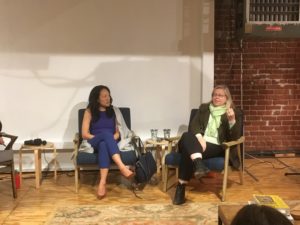
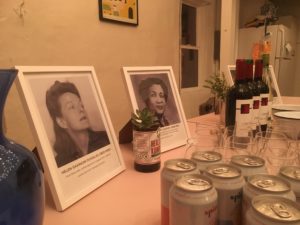
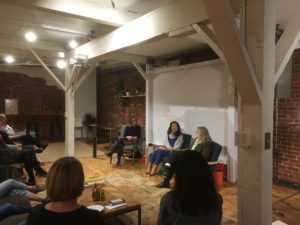
In last month’s midterms elections, a wave of diverse women swept into political office across America. From local school boards to Congressional and gubernatorial races, women showed up this November. While many may point to this result as the culmination of women’s dedicated activism since 2016, in places like the Bay Area, well-established political organization helped pull women candidates over the finish line.
On Tuesday, November 13th, one week after the polls closed, OHC staff and local political buffs met at The Ruby to discuss the historical and contemporary role of political women in the Bay Area and to help kick off the Women in Bay Area Politics Oral History Project. The event featured a panel discussion with political consultant and Close the Gap California founder Mary Hughes and San Francisco Supervisor Jane Kim. From their combined years of experience, Hughes and Kim shared insight into what it’s like being a woman in Bay Area politics.
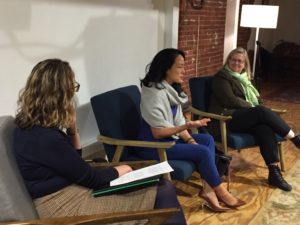
One great question from the audience asked the panelists about how women balance family obligations and political careers. Hughes recalled overhearing a recent conversation in which a woman was praised for waiting to run for office until her children were older. Hughes was dismayed to realize these double standards still existed for women in 2018, and noted that men do not face similar criticism. Similarly, Kim explained that her office is full of working mothers, and that while this was a challenge to balance at first, it also has helped productivity during normal work hours.
Hughes also reminded the audience that while women’s campaign successes are nearly on par with that of men, the struggle often occurs when trying to convince women to run for office in the first place. Even when they are extremely qualified, some women need to be asked more than once. Hughes praised Kim for continuing to run and participate in politics, even after setbacks. She explained that dusting yourself off and trying again is important in order to push toward gender equality in political office.
The stories Hughes and Kim shared reinforced the need to document the histories of Bay Area political women in order to get a clearer picture of the breadth of political work women have been doing on the ground and behind the scenes. Now is the time to undertake this endeavor to celebrate and learn from Bay Area women who have shaped local and national politics.
Please help us out by suggesting women narrators whose political work has been unsung! Which stories about women in politics aren’t making it into the historical record?
To support the Bay Area Women in Politics Project, visit ucblib.link/givetoOHC. Please note under special instructions: “For the Bay Area Women in Politics Oral History Project.”
If you would like to learn more about the project, please contact Amanda Tewes at atewes@berkeley.edu.
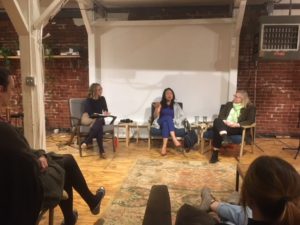
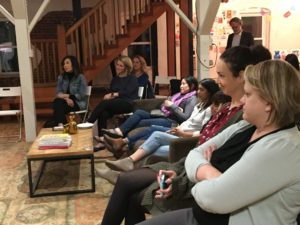
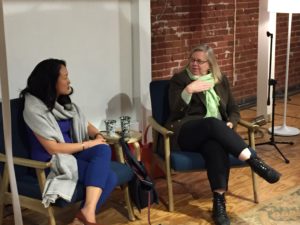
11/13 Event: Women in Bay Area Politics Panel and Discussion
By Amanda Tewes, OHC interviewer
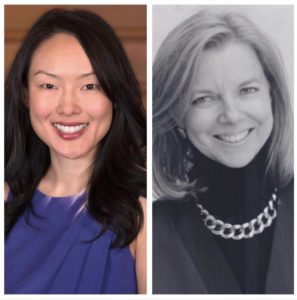
Join us on November 13, 2018, 6-8 PM at The Ruby, a women’s creative working space in San Francisco! The festivities feature a panel discussion with Supervisor Jane Kim and Close the Gap California founder Mary Hughes.
1992 has been dubbed “The Year of the Woman,” a phenomenon in which a wave of women candidates swept local and national races for public office. California led this charge by becoming the first state in American history to be represented by two women senators—Barbara Boxer and Dianne Feinstein.
And yet, 1992 was not the beginning of women’s political activism, but rather the culmination of decades of organization encouraging women to get involved and run for office. For generations, Bay Area women have built the foundations of political activism that span neighborhood organizations to support networks. And their stories inform our present.
As engaged citizens, we need to know more about these women who helped create a space for themselves in Bay Area political life. What drives women to run for elected office, to fight for affordable housing and environmental regulations, to fundraise for women candidates? What challenges and successes have women encountered in politics?
In order to document these stories, I am developing the Bay Area Women in Politics Oral History Project to record the history of these local women and their impact on and journeys through politics. The Oral History Center continues to preserve stories about California politicians, but this project is unique in that it focuses on women in one geographic region in order to get a clearer picture of the breadth of political work women have been doing on the ground and behind the scenes.
This topic is both historical and part of a contemporary conversation about the role of women in American politics. Given this surge of women in politics and the upcoming hundredth anniversary of women’s suffrage, now is the time to undertake this endeavor to celebrate and learn from Bay Area women who have shaped local and national politics.
Join us to kickoff this the Bay Area Women in Politics Oral History Project with an event on November 13, 2018, 6-8 PM at The Ruby, a women’s creative working space in San Francisco! The festivities feature a panel discussion with Supervisor Jane Kim and Close the Gap California founder Mary Hughes.